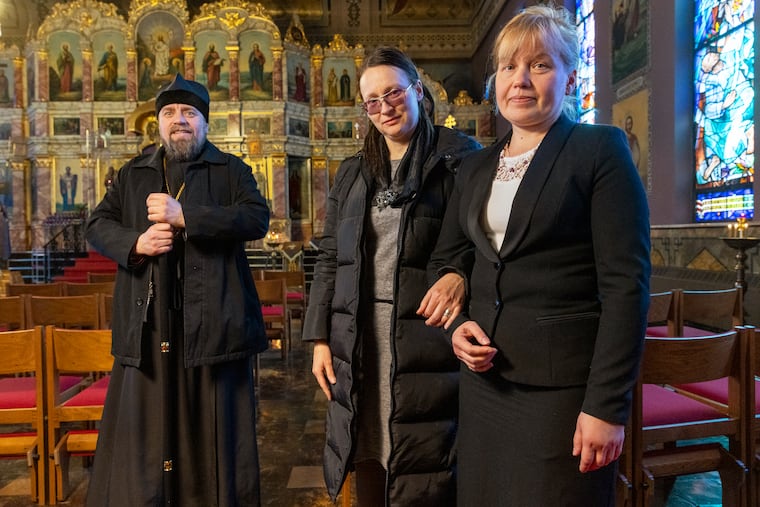‘We hurt.’ Two Ukrainian refugees say they are grateful to be safe in a Philly church rectory.
The women left their homes in the capital of Kyiv as bombs fell, making their way to Lviv in the west, and later Warsaw, where they lived in a McDonald's.

Two shaken and exhausted Ukrainian war refugees awoke to new lives in a Philadelphia church rectory on Wednesday, grateful to be safe but struggling to comprehend the violence and destruction from which they fled.
“We hurt,” said Veronika Matviienko, 50, in an interview at St. Nicholas Orthodox Cathedral in the Northern Liberties neighborhood. “We are afraid of sounds, of cars, of the motors, because we have the association with those rockets, bullets, shots.”
She and a work colleague, Alla Pukhteska, 42, arrived in the United States only hours earlier.
They fled their homes in the capital of Kyiv in early March, as the Russian bombardment grew, making their way to Lviv in the west. From there they traveled north, going much of the way on foot, joining an estimated 2.3 million refugees who have crossed into Poland.
“It was a real war,” said Pukhteska, her voice weary and almost disbelieving as she described seeing ruined buildings and unexploded ordnance. “It’s a constant understanding that you’re not protected, that you cannot sleep, that you all the time have to run.”
In Warsaw they spent several nights sleeping in a McDonald’s, having nowhere else to go and with little money to rent expensive rooms.
“It was difficult,” Pukhteska said. “We decided to stay in a safe place.”
They described tearful scenes of Ukrainian men escorting spouses and children to the Polish border, saying goodbye, perhaps forever, then turning back to fight the war in Ukraine.
Men aged 18 to 60 are not allowed to leave the country.
Pukhteska, a theology teacher and lawyer, and Matviienko, a choir director, are work colleagues at St. Volodymyr’s Cathedral in central Kyiv. Through that cathedral they had a connection to St. Nicholas church Bishop Luke Zhoba.
They phoned him from Warsaw and pleaded for help.
Church officials here wrote a letter of invitation, directed the women to the U.S. Embassy in Warsaw, and alerted Ukrainian and Polish clergy to try to assist. At the embassy the two managed to secure expedited interviews and visas.
On Tuesday night they arrived at JFK International Airport in New York City on a LOT Polish Airlines flight. They were met by Bishop Zhoba and Susan Guz, vice president of the governing church council, who drove them to Philadelphia.
“I’m so happy — right now they are safe,” the bishop said on Wednesday.
The women spent a fitful night in the church rectory, which was outfitted with bedding and supplies.
They rose on Wednesday morning to a world of uncertainty in a country neither had ever seen. Both said they want to return home, to family and friends, but don’t know when that day might come. Not while the war rages.
It was impossible to think about the future, they said.
Pukhteska arrived wearing donated shoes. Matviienko managed to bring a small bag of medical supplies, though a bag of clothes was lost along the way.
Between them they know one person in the United States.
The women are among the first Ukrainian war refugees to arrive in Philadelphia, ahead of a tide that’s expected to come over the next year. President Joe Biden committed the United States to accepting 100,000 refugees, and Philadelphia, with its large and vibrant Ukrainian community, is projected to be a main destination.
On Wednesday morning, the women sat amid the ornamentation of St. Nicholas church, fielding questions at an institution that was founded by immigrants in 1917. Today the surrounding neighborhood is festooned in blue-and-yellow Ukrainian flags and signs.
Neither had wanted to leave Kyiv.
“I insisted,” Pukhteska said, as she recalled an intensifying Russian assault that set structures ablaze, killed people around them, and sent others running to make-shift basement bomb shelters. “It’s the last chance.”
Buildings that were upright one minute were rubble the next.
The city of Lviv has become a departure point for northbound refugees, 4 million of whom have fled Ukraine. Nearly 60% have gone to Poland.
The two arrived in and left Lviv with little money, with many Ukrainian institutions having been unable to pay their workers amid the carnage of the war.
Though the two are refugees by U.N. definition — someone who has fled their homeland because of persecution — in the eyes of U.S. immigration authorities they are visa-holders.
The process through which people enter the United States is important, because it directly impacts the level of government support they can receive and their ability to stay in the country permanently. Visas expire, while people who are admitted as legal refugees are required to become permanent residents and can then apply for U.S. citizenship.
On Wednesday, neither woman could predict what the future might hold. For now they’ll stay at the rectory of the church, which expects to soon receive a refugee family of six.
Both said they want to use their professional skills to work, to contribute, to help others grow and learn.
“We’re very thankful for the protection, for the kindness, for the possibility to enter this peaceful country,” Pukhteska said. “We’re active people willing to provide something important.”